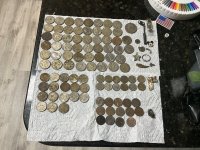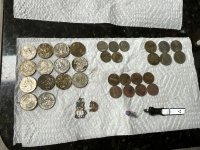DeepseekerADS
Gold Member
- Mar 3, 2013
- 14,880
- 21,725
- Detector(s) used
- CTX, Excal II, EQ800, Fisher 1260X, Tesoro Royal Sabre, Tejon, Garrett ADSIII, Carrot, Stealth 920iX, Keene A52
- Primary Interest:
- Other
1970s Viking Rovers Likely Found Life on Mars » Alex Jones' Infowars: There's a war on for your mind!
There may also be water on the Red Planet
RT - October 24, 2016
This year the Curiosity rover supposedly discovered traces of life on Mars, but a study claims NASA may have had evidence of life in the Martian soil as early as 1976.
The Viking rovers 1 and 2 were Earth’s first spacecrafts to land on Mars, they took the first high-resolution images of the red planet and were the first to collect geological data.
Now, in a study recently published in the journal of Astrobiology, scientists Gilbert Levin and Patricia Ann Straat, from Arizona State University and the US National Institutes of Health, say the soil collected by the robots 40 years ago is in need of another testing.
Viking 1 and 2 conducted three probes into Mars’ biology by collecting soil, one of which was done with the Labeled Release (LR) experiment. Scientists tested the soil picked up by the rovers for any signs of life by mixing it with nutrient-rich water.
Supposedly, if the soil contained signs of life, it would metabolize the nutrients in the water dropped by the robot – and, surprisingly, it did. The LR test was reportedly compared to Earth soil from Death Valley to Antarctica just to be sure, which seemed to support a positive result for life on Mars.
However, the two other soil experiments proved to be less exciting as they contained no evidence of organic material, and therefore no presence of life, so NASA concluded that a non-biological process must be responsible for the supposed false positive of LR’s result.
However, in light of recent findings, the study by Dr.Levin and Dr.Straat into LR’s results suggests it’s possible that biological processes were responsible for the positive result and the doctors are calling for the soil to be reexamined.
“Many believe that the martian environment is inimical to life and the LR responses were nonbiological, attributed to an as-yet-unidentified oxidant (or oxidants) in the martian soil,” the authors write.
“That extant life is a strong possibility, that abiotic interpretations of the LR data are not conclusive, and that, even setting our conclusion aside, biology should still be considered as an explanation for the LR experiment.”
NASA concurred that the study makes a strong case for the contradictory results to be reexamined, adding that the possibility of life on Mars “must be considered”.
“Even if one is not convinced that the Viking LR results give strong evidence for life on Mars, this paper clearly shows that the possibility must be considered,” said Dr. Chris McKay, a senior editor of Astrobiology and an astrobiologist with NASA, to Science Daily.
“We cannot rule out the biological explanation. This has implications for plans for sample return from Mars and for future human missions,” he added.
There may also be water on the Red Planet
RT - October 24, 2016
This year the Curiosity rover supposedly discovered traces of life on Mars, but a study claims NASA may have had evidence of life in the Martian soil as early as 1976.
The Viking rovers 1 and 2 were Earth’s first spacecrafts to land on Mars, they took the first high-resolution images of the red planet and were the first to collect geological data.
Now, in a study recently published in the journal of Astrobiology, scientists Gilbert Levin and Patricia Ann Straat, from Arizona State University and the US National Institutes of Health, say the soil collected by the robots 40 years ago is in need of another testing.
Viking 1 and 2 conducted three probes into Mars’ biology by collecting soil, one of which was done with the Labeled Release (LR) experiment. Scientists tested the soil picked up by the rovers for any signs of life by mixing it with nutrient-rich water.
Supposedly, if the soil contained signs of life, it would metabolize the nutrients in the water dropped by the robot – and, surprisingly, it did. The LR test was reportedly compared to Earth soil from Death Valley to Antarctica just to be sure, which seemed to support a positive result for life on Mars.
However, the two other soil experiments proved to be less exciting as they contained no evidence of organic material, and therefore no presence of life, so NASA concluded that a non-biological process must be responsible for the supposed false positive of LR’s result.
However, in light of recent findings, the study by Dr.Levin and Dr.Straat into LR’s results suggests it’s possible that biological processes were responsible for the positive result and the doctors are calling for the soil to be reexamined.
“Many believe that the martian environment is inimical to life and the LR responses were nonbiological, attributed to an as-yet-unidentified oxidant (or oxidants) in the martian soil,” the authors write.
“That extant life is a strong possibility, that abiotic interpretations of the LR data are not conclusive, and that, even setting our conclusion aside, biology should still be considered as an explanation for the LR experiment.”
NASA concurred that the study makes a strong case for the contradictory results to be reexamined, adding that the possibility of life on Mars “must be considered”.
“Even if one is not convinced that the Viking LR results give strong evidence for life on Mars, this paper clearly shows that the possibility must be considered,” said Dr. Chris McKay, a senior editor of Astrobiology and an astrobiologist with NASA, to Science Daily.
“We cannot rule out the biological explanation. This has implications for plans for sample return from Mars and for future human missions,” he added.





